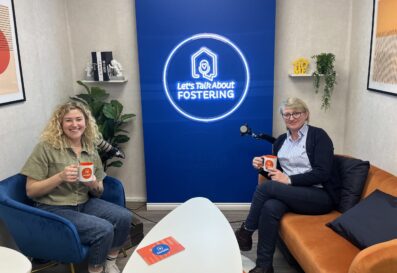
An 18-month-old assistance dog is proving to be a powerful tool for improving the mental health of vulnerable children and young people in Kent.
Whether they are fluffy or furry, studies suggest that contact with animals has significant benefits for the mind, and in celebration of National Pet Month this month, we explore how this fuzzy form of therapy is helping vulnerable children and young people in care.
Animal-assisted therapy uses animals as part of a treatment plan. It can be used to help children learn empathy, communication and social skills.
BACP Accredited Therapist, Charanjit Dhaliwal has been working with us along with her therapy dog, Poppy, to deliver animal-assisted therapy to children in care and is delighted by the comfort and additional scope for therapeutic interventions that Poppy has brought to children and young people that need it the most.
She commented: “When children come in and talk about conflict or any issues they have, to be able to get those children to engage with an animal really helps them to understand the situation from a different perspective, for example, that if an animal has choices, so do their friends and that it’s not always personal towards them.”
“When children need comforting, Poppy sits on the sofa and the children will just sit and stroke her. A child will process what is going on with them through play. Stroking a dog is a great way to soothe them. They learn about being respectful and understand the importance of asking for permission from the dog.”
Pets, especially dogs and cats, can have amazing therapeutic benefits for children and young people with complex emotional and behavioural needs.
Poppy, who is a Hungarian Vizsla has been comforting children and young people since September 2019. Within her role, she helps to build confidence, lower anxiety levels, minimise the fear of animals, develop social skills and provides real-life scenarios for children to practice on.
Charanjit added: “Children may have some ongoing issues with somebody else and they’ll role play with Poppy. Poppy becomes the other person and they’ll use her to address their issues with.
“The Children may find it difficult to verbalise their emotions at times, sometimes telling Poppy or writing her a letter may be easier. Dogs are a great ice breaker, particularly for children that are reluctant or lack trust. To see an animal being loved and cared for can help a child to assess whether the adult doing the caring is worthy of trust.
“I had one child who was very nervous, within five minutes, she was laying on the floor stroking Poppy, that’s how quickly children can adapt to animal assisted therapy.”
Alison Capp, Registered Manager for ISP Whitstable, commented: “We’re delighted that Chranjit has trained Poppy to deliver animal-assisted therapy as she’s been an invaluable asset. The unconditional love and companionship that Poppy brings has had enormous therapeutic benefits for children and young people in our care.
“We’re looking forward to seeing more fantastic developments through animal-assisted therapy.”
If you’d like to learn more about how to become a foster carer and fostering allowance today, why not speak to our team on 0800 0857989.






